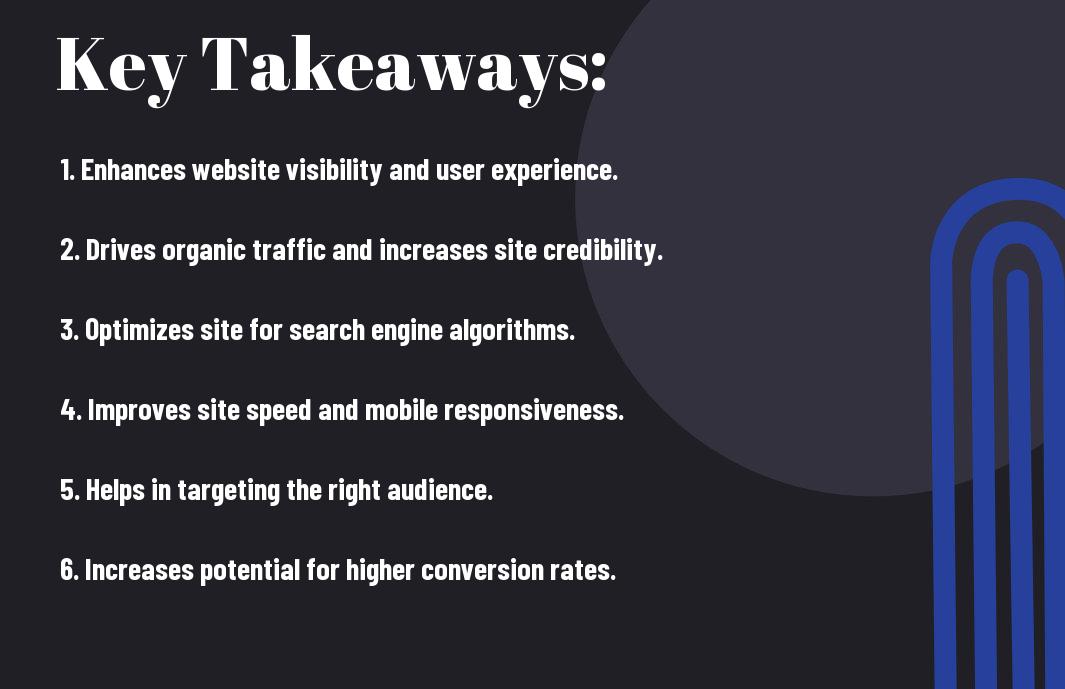Delve into the world of web design and development, and you’ll quickly realize how crucial it is to have a deep understanding of SEO. Your website’s success ultimately depends on its visibility and ranking in search engine results, and that’s where SEO comes into play. By optimizing your site for search engines, you can significantly enhance your online presence, attract more organic traffic, and ultimately maximize your business’s potential. In this blog post, we’ll explore the critical role that SEO plays in web design and development, and how you can incorporate it effectively to ensure the success of your website.
Key Takeaways:
- Improved Visibility: SEO helps in improving the visibility of a website on search engines, making it easier for potential customers to find the website.
- User Experience: Incorporating SEO practices in web design and development can enhance the overall user experience, leading to higher engagement and conversion rates.
- Competitive Advantage: Utilizing SEO in web design gives businesses a competitive advantage by ranking higher on search engine results pages and attracting more organic traffic.
- Long-Term Results: Properly implementing SEO techniques in web design and development can lead to long-term, sustainable results, driving consistent traffic and leads to the website.
- Cost-Effective Marketing: SEO is a cost-effective marketing strategy that can deliver high-quality leads and customers to a website without requiring significant advertising spend.


The Role of SEO in Web Design
Even if you have a visually stunning website, it won’t be effective without proper search engine optimization (SEO). In fact, SEO is not just about keywords and backlinks – it also plays a crucial role in the design and development of your website. Here’s why SEO should be an integral part of your web design process.
SEO-Friendly Design Principles
When it comes to web design, it’s essential to ensure that your website is optimized for search engines. This means implementing SEO-friendly design principles such as a clear site structure, mobile responsiveness, fast loading speed, and user-friendly navigation. These factors not only improve your search engine rankings but also provide a better experience for your visitors, ultimately leading to higher conversion rates and increased engagement.
Impact of User Experience on SEO
Your website’s user experience (UX) plays a critical role in its SEO performance. Search engines like Google prioritize websites that provide a positive user experience, including easy navigation, relevant content, and fast load times. By focusing on UX in your web design, you can reduce bounce rates, increase dwell time, and ultimately improve your search engine rankings. Remember – a well-designed website that prioritizes both SEO and user experience can set you apart from the competition and drive more organic traffic to your site.
Technical SEO for Developers
Despite your expertise in web development, it’s crucial that you also have a good grasp of technical SEO. This will help ensure that the websites you build are not only aesthetically pleasing, but also optimized for search engine visibility and ranking. To learn more about the intersection of SEO and web design, read our blog post “What is SEO Web Design? How SEO and Web Design Work Together”.
Site Structure and Its Importance for SEO
When it comes to technical SEO, the structure of your website plays a critical role in determining its search engine visibility. Well-organized site structure allows search engine crawlers to easily access and index your content, improving your chances of ranking higher in search results. Properly optimized URLs, user-friendly navigation, and a clear hierarchy of pages all contribute to a strong site structure that can positively impact your SEO efforts.
Ensuring Mobile Optimization and Speed
Another crucial aspect of technical SEO is ensuring that your website is optimized for mobile devices and has fast loading times. With the majority of web traffic now coming from mobile devices, mobile optimization is essential for providing a good user experience and improving your search engine rankings. Additionally, page loading speed is a key ranking factor, and websites that load quickly are more likely to appear higher in search results.
Content Strategy and SEO
For a successful SEO strategy, creating high-quality content is crucial. Your content should not only be informative and engaging but also optimized for relevant keywords to improve your website’s search engine ranking. When you develop your website’s content strategy with SEO in mind, you can significantly increase your chances of attracting more organic traffic and achieving a higher ranking on search engine results pages.
Keyword Research and Content Creation
When conducting keyword research for your content, focus on long-tail keywords that are relevant to your industry and have a high search volume. Incorporating these keywords strategically in your content can help improve your website’s visibility in search engine results. Your content creation process should revolve around these keywords, ensuring that your website’s content meets the needs and interests of your target audience while optimizing it for search engines.
Utilizing Metadata and Tags Effectively
Metadata and tags play a crucial role in optimizing your website for search engines. When used effectively, metadata, including title tags, meta descriptions, and alt text, can help search engines better understand the content of your website. Incorporating relevant keywords in your metadata and tags can significantly impact your website’s search engine ranking. Additionally, using schema markup can provide search engines with more detailed information about your website’s content, further improving your visibility in search results.
Measuring SEO Success
Now that you have implemented SEO strategies into your web design and development, it’s important to measure the success of your efforts. This will help you understand the effectiveness of your SEO techniques and make necessary adjustments to your website. To learn more about what SEO web design is and why it’s important for your business, you can read this informative article here.
Tools and Techniques for Tracking SEO Performance
There are various tools and techniques available to help you track the performance of your SEO efforts. Using tools like Google Analytics, SEMrush, and Ahrefs, you can monitor key metrics such as organic traffic, keyword rankings, and conversion rates. These insights will give you a clear understanding of how well your website is performing in search engine results and help you identify areas for improvement.
Adapting and Evolving SEO Strategies
SEO is an ever-evolving landscape, and it’s crucial to adapt your strategies to keep up with the latest trends and algorithm updates. By staying proactive in understanding changes in search engine algorithms and consumer behavior, you can ensure that your website remains optimized for search. This may involve updating content, refining keyword targeting, and adjusting technical aspects of your website to maintain and improve your search engine rankings.
By regularly measuring the success of your SEO efforts, utilizing tools for tracking performance, and adapting your strategies as needed, you can ensure that your web design and development efforts are effectively optimizing your website for maximum visibility and success. With these measures in place, you can stay ahead of the competition and drive more organic traffic to your website with strong SEO practices.
The Importance of SEO in Web Design and Development
Upon reflecting on the significance of SEO in web design and development, it becomes clear that optimizing your website for search engines is crucial for gaining visibility and driving traffic. By strategically incorporating SEO elements into your website, you can improve your chances of ranking higher in search results, ultimately increasing your online presence and attracting more potential customers. Additionally, implementing SEO practices from the beginning of the design and development process can save you time and resources in the long run, as it reduces the need for extensive revamping and adjustments later on. Embracing SEO in web design and development is not just beneficial, it is essential for the success of any website or online business.
FAQ
Q: What is the importance of SEO in web design and development?
A: SEO, or search engine optimization, is crucial in web design and development as it determines the visibility of a website in search engine results. A well-optimized website enhances its chances of ranking higher in search engine results pages, driving more organic traffic and potential customers.
Q: How does SEO influence web design and development?
A: SEO influences web design and development by guiding the creation of user-friendly and search engine-friendly websites. This includes optimizing site structure, content, and meta-tags, as well as ensuring mobile responsiveness and fast loading speed, all of which contribute to a better user experience and higher search engine rankings.
Q: What are the key elements of SEO in web design and development?
A: The key elements of SEO in web design and development include keyword research and integration, on-page optimization, site architecture, quality content creation, mobile optimization, and technical SEO such as URL structure, sitemaps, and site speed optimization.
Q: How does SEO affect user experience in web design and development?
A: SEO and user experience are closely intertwined in web design and development. A well-optimized website provides valuable and relevant content for users while making it easier for search engines to understand and rank the site. This leads to a seamless and efficient user experience, resulting in higher engagement and conversions.
Q: Why is it important to consider SEO from the beginning of web design and development?
A: Considering SEO from the beginning of web design and development ensures that the website is built with search engine best practices in mind, saving time and resources in the long run. It also helps in establishing a strong online presence and achieving sustainable organic traffic growth, ultimately leading to higher visibility and business success.
